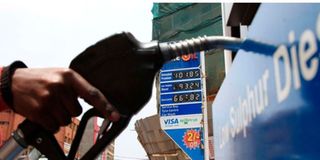High VAT on fuel will hurt the poor more

An attendant at a Nyeri petrol station prepares to fill up a car in August 2020. For many Kenyans, the cost of fuel is already a major burden. The average Kenyan spends about 10 per cent of their income on transportation.
The Kenyan Parliament's decision to endorse the increment of VAT on fuel from 8 per cent to 16 per cent is a major blow to hustlers, happening just a few months after the same government promised to reduce the cost of living.
It must be remembered that this government promised to reduce the cost of unga to under Sh150 per 2kg packet, something that is yet to happen. This tax will increase the cost of fuel, transportation, and other goods and services that rely on fuel.
For many Kenyans, the cost of fuel is already a major burden. The average Kenyan spends about 10 per cent of their income on transportation. This means that a 16 per cent VAT on fuel could increase the cost of transportation by 1.6 per cent. For a family that already struggles to make ends meet, this is a significant increase.
The VAT on fuel will also have a ripple effect on the cost of other goods and services. Transportation costs make up a significant portion of the cost of goods that are transported by road, such as food and agricultural products. This means it will lead to higher prices for these goods.
Negative impact
The VAT on fuel is also likely to have a negative impact on the economy. Higher fuel prices will make it more expensive to do business, which could lead to job losses and a decrease in economic growth.
The Kenyan government has argued that the VAT on fuel is necessary to raise revenue. However, there are other ways to raise revenue that would not have such a negative impact on the common man.
For example, the government could increase taxes on the wealthy (which might, and will also make them seek to invest elsewhere) or cut spending on non-essential programs such as the many unnecessary trips being taken at the taxpayer’s expense. The government could also focus on fighting corruption. Again, what is the justification for the government buying new fuel guzzlers every year? Why not use the already available vehicles?
The VAT on fuel is a retrogressive tax that will disproportionately hurt the poor and the middle class.
In addition to the economic impact, the VAT on fuel will also have a social impact. Higher fuel prices will make it more difficult for people to get to work, school, and other essential services. This could lead to social unrest.
The Kenyan government should carefully consider the potential impacts of the VAT on fuel before implementing it. This tax could have a devastating impact on the poor and the middle class, and it could also lead to social unrest. The government should find a more equitable way to raise revenue. Otherwise the poor have nothing to lose. I am sure next time the opposition calls for protests, many more people will be out on the streets.
Dan Lukorito, Nairobi




